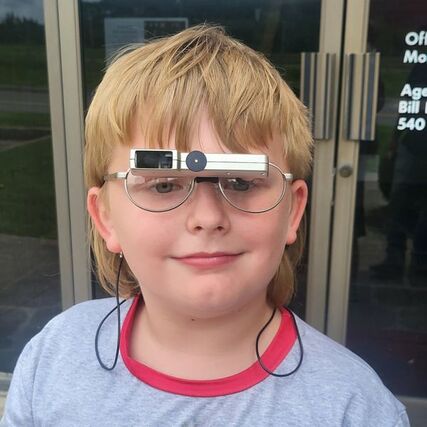Telescopic Eyeglasses specially designed for visual impairmentIs seeing family and friends, watching television, traveling, shopping, playing games, attending church, reading computers or music, seeing in the classroom, enjoying museums, performances, gardening or the outdoors a challenge?
Reduced vision does not have to prevent you from leading an engaged and fulfilling life. With your motivation and help from Ocutech’s bioptic telescopic low vision aids, you may be able to bring your world into focus, making it easier to see and do things you may have never thought possible. |
Helping individuals to see better at any distance
Why enhancing distance vision is so important!
While reduced vision can make reading harder, it also makes seeing at a distance and at midrange more difficult. While there are many ways to access the printed word if you cannot read it yourself, no one can see your family, friends, or the beauty of the world around you for you!
Distance vision is an important social sense allowing us to make eye contact, read body language, and feel connected to the world around us. Loss of distance vision impacts independence and can make one feel isolated and depressed. Studies have shown that reduced distance vision can impact quality of life in ways that loss of reading vision does not.
Distance vision is an important social sense allowing us to make eye contact, read body language, and feel connected to the world around us. Loss of distance vision impacts independence and can make one feel isolated and depressed. Studies have shown that reduced distance vision can impact quality of life in ways that loss of reading vision does not.
Reduced Distance Vision Can Impact Individuals Of All Ages
Seniors who have developed macular degeneration, macular holes, diabetic retinopathy or optic atrophy likely enjoyed normal vision until later in their adult years. They may first notice difficulty reading small print, and needing to move closer to recognize friends and family or to watch television. Social events may become less enjoyable
Adults with acquired or congenital vision loss who are pursuing their careers need to maximize their potential to be independent. This often includes the more demanding environments of higher education, addressing independent travel needs, seeing in the work place, connecting with friends and colleagues in both vocational and social settings.
Children who are born with visual impairments including albinism, nystagmus, achromatopsia, rod/cone dystrophy, Stargardt’s disease, myopic degeneration, ROP and optic nerve disorders may have never known normal vision. Their visual world may not extend much further than a few feet away, and, as a result it is difficult for them to fully engage in important childhood socialization activities. Problems seeing the front of the room in school can make academic success more challenging. Socialization, which requires the ability to see at a distance for activities such as sports, drama, movies, TV, video games, and just “hanging-out” can make visually impaired children feel left out.
Helping individuals to see better at any distance.
Ocutech bioptic telescopes can help a visually impaired individual see better at any distance, but are especially helpful for use at distance for viewing television, movies and theater, seeing faces, signs, blackboards in school, shopping, traveling, and mid-range distances such table-top activities including card and game playing, reading music and the computer. Ocutech wearers have even used their systems to drive, hike, golf, bowl, paint, fish and mow the lawn.
What kind of visual impairments are Ocutech Bioptics useful for?
Ocutech telescopic systems are intended for individuals of any age with vision loss affecting central vision with best corrected spectacle visual acuity between 20/60 and 20/300. Vision should be responsive to telescopic magnification and the individual should have activity goals appropriate for telescopic devices. Watch a video to learn if bioptic telescopes can help you.
Ocutech bioptic telescopes have helped individuals with reduced vision from:
- Macular Degeneration
- Diabetic Retinopathy
- Albinism
- Myopic Degeneration
- Nystagmus
- Stargardt’s Disease
- Optic Atrophy
- Macular Holes
- Achromatopsia
- Rod/Cone Dystrophy
- Retinopathy of Prematurity
- and many others.

